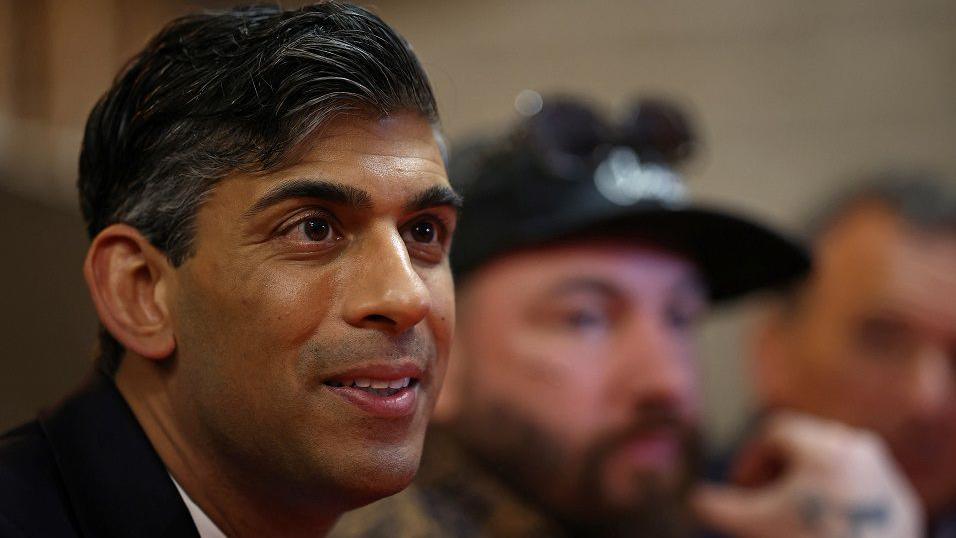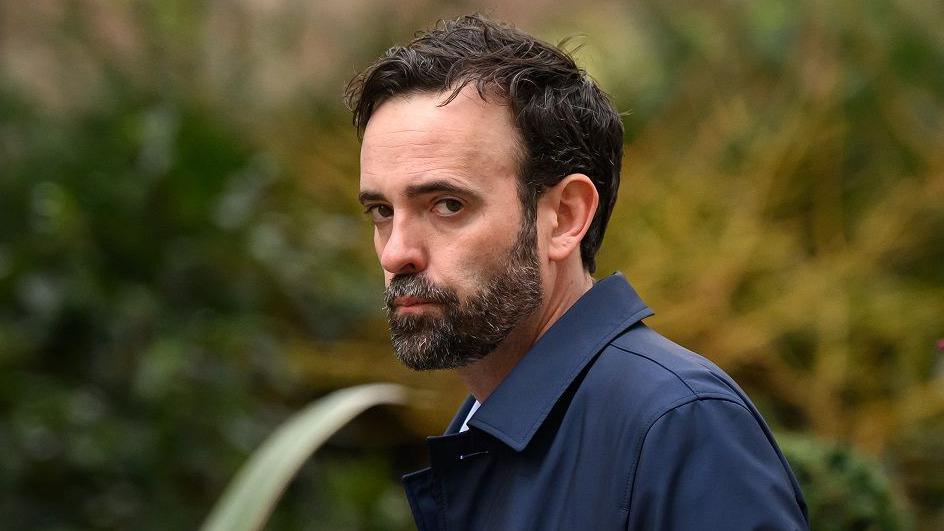How Rishi Sunak sprang election surprise on Tories

- Published
“Labour MPs are happy. We’re not. That tells a story,” one minister fumed in my general direction as he reeled off a list of legislation he had been involved in, now headed for the shredder.
That’s just one illustration of the explosive mood in Westminster on Wednesday evening as Conservative MPs reacted to Rishi Sunak’s sudden announcement of a July election with reactions ranging from enthusiasm to outrage.
All of Mr Sunak’s MPs, though, were blindsided - including cabinet ministers who had no inkling of what was coming either, even being sent a fake agenda for their Wednesday afternoon meeting.
Now that it’s clear that the election really is on, many Conservatives are asking each other a simple question: why?
Why did Mr Sunak abruptly, as one senior Conservative put it, “confound the assumption of the entire establishment, not to mention Tory MPs, that it would be autumn - and drop this on them from a height”?
It’s worth stating the obvious that this will have all felt a lot less abrupt for Mr Sunak’s tight inner circle.
Among the prime minister’s confidants, a lively debate has been raging for months about when the general election should take place.
Oliver Dowden, the deputy prime minister and Mr Sunak’s closest friend in the Commons, Liam Booth-Smith, his chief of staff, and James Forsyth, his old friend and political secretary, were at the heart of the deliberations.
One of those arguing against an early election, according to multiple sources, was Isaac Levido - the man now charged with running the summer campaign.
Sunak and Starmer take campaigns to the country after 4 July election called
- Published23 May 2024
A simple guide to the 4 July general election
- Published4 July 2024
UK's future in your hands, Starmer tells voters
- Published22 May 2024
Mr Levido is an Australian elections guru who also ran Boris Johnson’s successful 2019 general election campaign, having learnt his trade under the wing of Sir Lynton Crosby, mastermind of Lord Cameron’s election victories.
This is strongly denied by the Conservatives and, this morning, by Mr Sunak himself, who told LBC it was “not true” that Mr Levido argued against the July date.
The balance of the argument is understood to have been drifting towards a summer election for some time - indeed one source claimed it had been the agreed timeframe for “several months.”.
James Nation, a former Treasury civil servant who is Mr Sunak’s deputy director of policy, has been working on the manifesto for several months, canvassing ideas from Conservative think tanks.
And in hindsight it is possible to see last week’s set-piece events - Mr Sunak’s speech about the dangerous world on the Monday; Jeremy Hunt’s attack on Labour’s economic policies on the Friday - as dress rehearsals.
You could look back a little further to late April and Mr Sunak’s trip to Germany where he announced ambitions to increase defence spending as another attempt to entrench general election dividing lines.
Mr Sunak is thought to have become particularly exercised about the possibility that if he waited until deep into 2024 to go to the polls, the public would perceive him to be a “squatter” in No 10.

Tory election mastermind Isaac Levido argued against a snap election
And what both sides of the election timing argument agreed on was that Mr Sunak needed to find a way, whenever he called the election, of seizing the initiative and framing the argument.
The inflation statistics on Wednesday morning - long expected to deliver a sharp drop in the rate of price rises - became an obvious launching point.
“Inflation is the number one thing he had to deal with when he came in as PM,” a senior Conservative source said.
“Undeniably we are back to normal now. We have done the central mission of his premiership - to deal with inflation and get the economy on the right path.”
Pointing to Mr Sunak’s ambitions to reform welfare and to enact the Rwanda small boats policy among other policies, the source continued: “Frankly we now need a mandate to be able to do those big bold things to put the country on the right path.”
Another reason to call an election for July became clearer during Mr Sunak’s interviews this morning, when he admitted that the Rwanda small boats policy would not begin until after 4 July's polling day.
Given Labour’s policy is to repeal the Rwanda plan, that sets up a clear dividing line on how to deal with small boats - without the government having to account for whether the flights have had any deterrent effect, as they would have had to if the election were in October or November after some flights had taken off.
Yet the timing could cut both ways strategically.
One influential Conservative MP on the right of the party declared during Wednesday’s febrile speculation that a summer election would be “madness”, telling me: “I know what question you’re going to ask us again and again.
"You’ll say we’ve been banging on about Rwanda for years and we’ve only managed to fly one migrant out there - and we paid him to go”.
The biggest reason so many Conservatives were aghast that Mr Sunak decided to call an election is that the party remains way behind in the opinion polls.
Others give this short shrift.
“It’s totally the right decision,” one ally of Mr Sunak said.
“The impulse for 'something will come up' is strong, but it’s a hostage to fortune.
“The economy is improving, he has the proof points he needs on that. Leaving it longer wouldn't have improved the political position at all.”